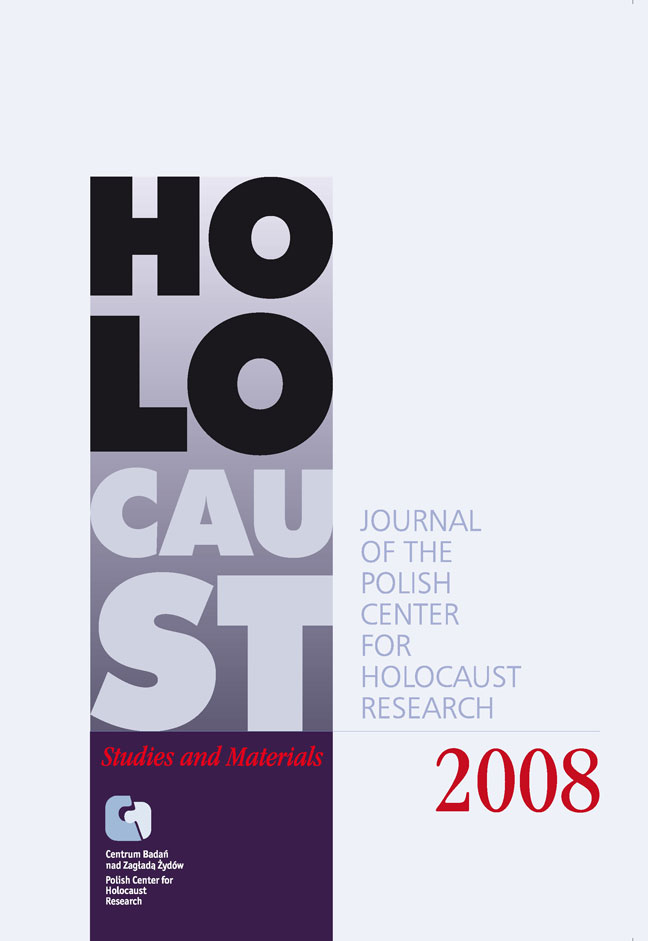Understanding the Holocaust. A Task for Generations
Zagłada Żydów. Studia i Materiały, 2008: Holocaust Studies and Materials, strony: 11-20
Data publikacji: 2008-12-01
Abstrakt
The Holocaust destroyed virtually the entire Jewish community in Poland. Zusman Segałowicz, the pre-war chairman of the Jewish Union of Writers and Journalists of 13 Tłomackie Street, Warsaw, managed to leave Warsaw in 1939 and via Vilna, Kaunas, Bulgaria, Turkey, and Syria reached Palestine, where, under the beating Tel-Aviv sun, he pondered on the burning ruins of the ghetto. His memoirs, published in 1946 in Argentina (the author died in New York in 1949), contain the following passage: I pass conflagration sites. I dig in the ashes. For the time being, these are the ashes of 13 Tłomackie St. All that is left of the entire Jewish world in Poland is a cemetery. Sometimes our pain leads us to divide this great cemetery into individual, smaller cemeteries: the cemetery of the Hassidic world, the cemetery of Jewish workers, merchants, entrepreneurs and industrialists, the cemetery of Jewish children who were to be our future. Finally, our thoughts run toward the cemetery of the Jewish spirit: the theatre, music, art, journalism and literature. We cannot depart from any of these cemeteries, but, at the same time, we should not come too close, for it could drag one into its endless abyss. What are we to do then? Shout? The dead won't hear us, and the world of the living is more dead than the world of the dead.
The Holocaust happened on our soil, in full view of Polish society, and it is an integral part – whether one wants it or not – of Polish history. For the Poles, the experience of the Holocaust remains a unique event and carries extraordinary responsibilities. Nevertheless, in terms of social awareness, the Shoah seems to belong to Jewish rather than to Polish history. Even today many Poles feel ill at ease, threatened or outright disappointed by the Jewish perceptions of the Holocaust and oftentimes the Jews are seen as rivals in the martyrology competition. Despite the recent historical research and public debates, culminating with the discussion around the Jedwabne crime, Polish society largely ignores the issues related to the Holocaust. Still too many myths and lies find their way to the public sphere and enter public circulation. This state of affairs is related, to a certain extent, to the sad legacy of decades of censorship and neglect under the communist rule. We believe that this should change. This is why we shall link research with educational activities in order to foster the knowledge of issues related to the Holocaust.
Słowa kluczowe
Zagłada, metodologia historii, pamiętniki, dzienniki, relacje
Licencja
Copyright (c) 2008 Zagłada Żydów. Studia i Materiały

Utwór dostępny jest na licencji Creative Commons Uznanie autorstwa – Użycie niekomercyjne – Bez utworów zależnych 4.0 Międzynarodowe.
https://creativecommons.org/licenses/by-nc-nd/4.0
Inne teksty tego samego autora
- Jacek Leociak, “I don’t want people laughing at me for hiding Jews at my place . . .” The Case of Zdzisław and Halina Krzyczkowski , Zagłada Żydów. Studia i Materiały: 2010: Holocaust Studies and Materials
- Ewa Domańska, Jacek Leociak, O zmierzchu postmodernizmu, krytycznej nadziei i o tym, co nam zostawiła Zagłada.z Ewą Domańską rozmawia Jacek Leociak , Zagłada Żydów. Studia i Materiały: Nr 7 (2011)
- Jacek Leociak, Stanislaw Sreniowski, From a Book of Madness And Atrocity , Zagłada Żydów. Studia i Materiały: 2008: Holocaust Studies and Materials
- Jacek Leociak, “History and Memory after the Holocaust in Germany, Poland, Russia, and Britain” , Zagłada Żydów. Studia i Materiały: Nr 3 (2007)
- Karolina Sulej, Jacek Leociak, „Uśmiechał się do mnie i przesyłał mi ręką pocałunki”. O relacji Dory Sztatman , Zagłada Żydów. Studia i Materiały: Nr 5 (2009)
- Jacek Leociak, Rachel Brenner, The Ethics of Witnessing. The Holocaust in Polish Writers’ Diaries from Warsaw, 1939–1945 , Zagłada Żydów. Studia i Materiały: Nr 11 (2015)
- Jacek Leociak, Miriam Akawia, Haderech ha’acheret , Zagłada Żydów. Studia i Materiały: Nr 3 (2007)
- Jacek Leociak, The Holocaust in a “Museum of life” (the Polin Museum and its trouble with the genius loci of the Muranów district) , Zagłada Żydów. Studia i Materiały: Nr Holocaust Studies and Materials (2017)
- Jacek Leociak, Censorship Keeping Guard over the Church. Krystyna Modrzewska’s Censored Memoir , Zagłada Żydów. Studia i Materiały: 2010: Holocaust Studies and Materials
- Jacek Leociak, Paweł Dobrosielski, Spory o Grossa. Polskie problemy z pamięcią o Żydach , Zagłada Żydów. Studia i Materiały: Nr 13 (2017)
 English
English
 Polish
Polish




